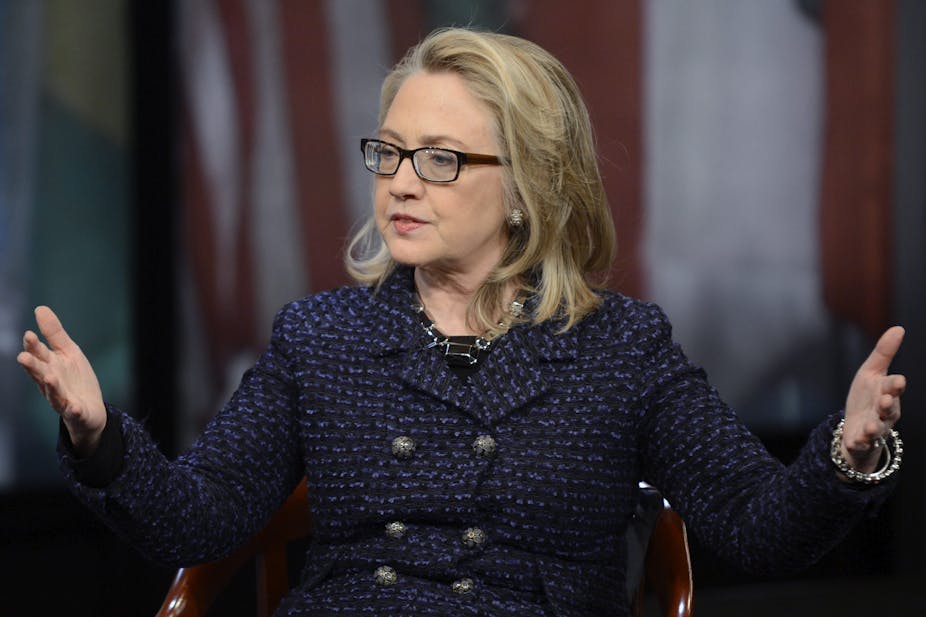Few people expected the opening shots of Hillary Clinton’s presidential campaign to be fired across the bow of the Obama administration. Yet in a recent interview, the former secretary of state took aim at President Barack Obama’s foreign policy stance, which he has succinctly described as “don’t do stupid stuff”.
In the interview, Clinton said:
Great nations need organising principles. ’Don’t do stupid stuff’ is not an organising principle.
Clinton hasn’t officially announced that she’s running – she’ll hold off until after the midterm elections – but the interview made clear that when she starts campaigning, she will draw bright lines between herself and the Obama administration in both substance and style.
Part of this is a reflection of profound policy differences between Clinton and Obama. Some outlets have attributed her recent comments to simple poll-reading: Obama’s approval rating in foreign policy has cratered in recent months as Ukraine, Gaza and Iraq have exploded in violence.
The Wall Street Journal chalked Clinton’s comments up to “political opportunism”. Karl Rove intimated the same when he called Clinton the “Goldilocks of foreign policy”, positioning herself between the belligerence of President George W. Bush and the restraint of Obama.
But Clinton has always been far more hawkish than Obama, willing to rely on intervention for both humanitarian and nation-building purposes. Those differences were tamped down in 2008 by the strong anti-Iraq sentiment in the Democratic Party, and then kept out of view for the next four years as Clinton headed up Obama’s State Department.
Now that Clinton’s on her own, she can freely speak out for intervention in Syria, for a more rigidly pro-Israel policy and for a hardline stance against Iran’s nuclear program.
These differences are not just about the substance of Clinton’s policy. They’re about the tone of it: tough, uncompromising. This, too, is about highlighting a difference with Obama.
Much of the critique of Obama within the Democratic Party is about his lack of backbone. Especially in the administration’s early days, Democrats felt Obama was far too eager to compromise, believing Republicans would meet him halfway. They didn’t.
In telegraphing toughness, Clinton hopes to send the message that things will be different when she’s president, that she’ll be able to knock Republican heads together and, through sheer force of will, cause Washington to function again. Wishful thinking, to be sure, but of the kind to which Americans are susceptible.
There is, of course, a danger to Clinton’s strategy. In criticising Obama for weakness at home and abroad, she is replicating Republican arguments about the administration. At a time when the president is embattled and Democrats are feeling protective, that’s an easy way to raise the ire of the party’s base.
Add to that Clinton’s hawkish foreign policy, which is stirring unease among liberals, and suddenly tacking away from Obama seems like an unnecessarily risky strategy. So why do it?

Because, as statistician and journalist Nate Silver shows, Clinton doesn’t face much risk of losing the Democratic base. Sure, she’s to the right of Obama on a number of issues. But consider this: 55% of Democrats identify as moderate or conservative, with 43% identifying as liberal. Republicans, by way of comparison, are far more ideological, with 28% identifying as moderate or liberal and 70% identifying as conservative.
Also, only 20% of independents identify as liberal. Given those numbers, Clinton can stake her claim to Obama’s right without much cost in either the primaries or the general election.
Liberals don’t seem to be going anywhere either. Among liberal Democrats, 70% name Clinton as their top choice for 2016.
Even those not keen on Clinton have few other options. Senator Elizabeth Warren, the darling of the Democratic left, has repeatedly declared she will not run. She has even thrown her support behind Clinton for the nomination.
Other potential challengers are either too undisciplined (like former governor Brian Schweitzer) or too far outside the mainstream (like democratic-socialist senator Bernie Sanders) to pose much of a threat.
So while commentators wring their hands, wondering if Clinton’s comments might cost her the nomination, in all likelihood this will be her strategy as her campaign gets underway next year. While praising the administration’s accomplishments in areas like health-care reform, she will continue to criticise the Obama administration as too weak, too conciliatory and too unwilling to exercise American power abroad.
And as long as Obama’s approval ratings remain low, that is likely to prove a winning strategy.

